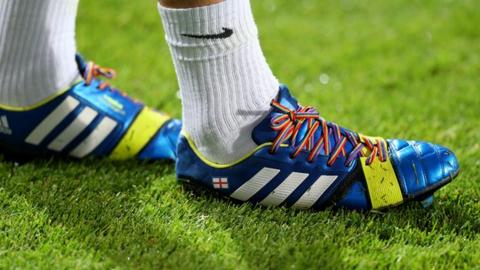
Sport is not doing enough to tackle homophobic abuse and authorities should issue lengthy bans to offenders, according to a report.
The report, published by the Commons Culture, Media and Sport Committee, wants sports authorities to adopt a zero-tolerance approach at all levels.
In highlighting football, it said attitudes in sport in general are out of step with wider society.
There are no openly gay professional male players in British football.
The wide-ranging report said more should be done to show support for athletes who want to come out.
It also said match officials at all levels of sport should have a clear duty to report and document any kind of abuse, and sporting authorities should issue immediate one to two-year bans to indicate clearly that homophobic behaviour would not be tolerated.
Damian Collins MP, chairman of the committee, said: “From the evidence we have received in this inquiry, we believe there are many gay athletes who have not come out, because they are frightened of the impact this decision will have on their careers, and the lives of the people they love.
“That is not acceptable and should not be tolerated.”
Spoty criticism
The committee said the report had been commissioned in part following Tyson Fury’s inclusion in the shortlist for the 2015 BBC Sports Personality of the Year award.
The inclusion of Fury, who had made homophobic remarks, is “symptomatic of homophobia not being taken seriously enough in sport, or the media that shows it”, according to the report.
The committee said it was “very dissatisfied” with BBC director general Tony Hall’s response to the controversy.
In a statement, a BBC spokesperson said: “The British public decides who becomes Sports Personality of the Year.
“A panel of experts in sport unanimously agreed that Tyson Fury should be on the shortlist for the public vote based solely on his sporting achievement in being crowned world heavyweight champion – we were clear it was not an endorsement of his personal views.”
The report’s key findings
- There is a problem in schools and youth sports, with serious concerns over the effects of low participation among lesbian, gay and bisexual (LGB) youth on their mental and physical health and well-being.
- In the long term, it is very likely that a number of sports have been robbed of talent, and young players and athletes may feel that they have to choose between coming out or continuing to participate in their sport.
- National governing bodies should step up their commitment to anti-homophobic campaigns, giving greater funds and resources to visible interventions such as Stonewall’s Rainbow Laces campaign.
- This should incorporate television and cinema advertisements, screens at football matches and outside advertising such as bus-stop advertisements. This must be a sustained effort over a significant period of time, rather than a short-term commitment.
- There is also a role for “straight allies” – straight players who act as champions for the cause and participate in education programmes and campaigns.
- Clubs and major sportswear brands could state their support for gay athletes and write into their agreements with players that there would be no termination or downgrading of their contracts as a result of a player coming out.
- Major sponsors should come together to launch an initiative in the UK to make clear that should any sportsperson wish to come out, they will have their support.
A Football Association spokesperson said: “We welcome the select committee’s report on how to address homophobia in sport and we will review it in full.
“It is an issue that we take very seriously and, as the chairman has previously stated, tackling homophobia, transphobia and biphobia in football is one of his top priorities.”
What is the background?
In 2012, a Culture, Media and Sport Committee report on racism in sport found homophobia was emerging as a “bigger problem in football than racism and other forms of discrimination”.
Research at the time found 25% of fans thought homophobia was present in football, compared to 10% who thought racism was.
In May 2015, the ‘Out on the Fields’ study – the first international study into homophobia in sport – found 73% of survey participants did not believe youth sports were a ‘supportive and safe’ place for LGB participants.
A recent Stonewall survey reported 72% of football fans have heard homophobic abuse while, in October, a BBC Radio 5 live survey found 82% of supporters would have no issue with a gay player, but 8% said they would stop watching their team.
‘A zero-tolerance approach’
Damian Collins MP, chair of the Culture, Media and Sport Committee
“No sportsperson should feel under pressure or feel ‘forced’ to come out, but sports authorities must create an environment, in the stadium and the locker room, where players and athletes at all levels feel it is a choice they can make, and that they will be supported and accepted if they do.
“More needs to be done by the authorities to address both the overt and latent homophobia that exists within sport.
“Sanctions appear to be left to the discretion of the club or governing body involved: a zero-tolerance approach to the use of all homophobic language and behaviours must be implemented with standardised sanctions across all sports.”
Sport must do more to fight homophobia, says report}

